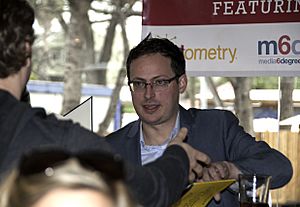Nate Silver facts for kids
Quick facts for kids
Nate Silver
|
|
|---|---|

Nate Silver playing poker at Manifest 2023, a forecasting conference, in Berkeley, California
|
|
| Born |
Nathaniel Read Silver
January 13, 1978 East Lansing, Michigan, U.S.
|
| Education | University of Chicago (A.B.) |
| Occupation | Statistician, journalist |
| Years active | 2000–present |
| Known for | PECOTA, FiveThirtyEight, Silver Bulletin |
Nathaniel Read Silver (born January 13, 1978) is an American statistician, writer, and expert in predicting outcomes. He is known for using math and data to understand things like sports and elections. He founded FiveThirtyEight, a popular website that uses data to analyze politics and other topics. He was the editor-in-chief there and a special correspondent for ABC News until May 2023.
Since leaving FiveThirtyEight, Silver has been writing for his online newsletter, Silver Bulletin. He also works as an advisor for Polymarket, a company that deals with predictions.
In 2009, Time magazine named Silver one of the world's 100 most influential people. This was after his model correctly predicted the results in 49 out of 50 states in the 2008 U.S. presidential election. His models also accurately predicted the outcomes of the 2012 and 2020 presidential elections. For the 2016 election, he gave Donald Trump a 28.6% chance of winning, which was a higher estimate than other scientific forecasts at the time.
Contents
Early Life and Education
Silver was born in East Lansing, Michigan. His mother, Sally, was a community activist, and his father, Brian David Silver, was a professor at Michigan State University. Nate showed a talent for math from a young age.
He became very interested in baseball when he was six years old. He loved how numbers were used in the sport, saying it was "always more interesting to apply it to batting averages than algebra class."
Silver also showed early skills in journalism. He wrote for his high school newspaper, The Portrait, from 1993 to 1996. In 1996, he won first place in a state scholarship contest for high school debaters in Michigan.
In 2000, Silver graduated with honors from the University of Chicago with a degree in economics. He also wrote for student newspapers there. He spent one year studying at the London School of Economics.
Early Career: 2000–2008
Working as a Consultant
After college in 2000, Silver worked for about three and a half years as a business consultant for KPMG in Chicago. He later said he didn't enjoy this job. While working there, he continued to develop his interest in baseball and statistics. He started creating his PECOTA system, which predicts how baseball players will perform.
In April 2004, he left his job at KPMG. For a while, he focused on his baseball analysis.
Baseball Analyst: 2003–2008
In 2003, Silver began writing for Baseball Prospectus (BP). He had sold his PECOTA system to BP in exchange for a share in the company. After leaving KPMG, he became an Executive Vice-President at BP.
Silver improved PECOTA and wrote a weekly column called "Lies, Damned Lies." He used advanced statistical methods to analyze many baseball topics. These included predicting how individual players would perform, understanding the business side of baseball, and valuing players.
Between 2003 and 2009, Silver helped write the Baseball Prospectus annual book, which forecasts Major League Baseball results. He also contributed to other books about baseball. He wrote articles about baseball for websites like ESPN.com and magazines like Sports Illustrated. He wrote over 200 articles for Baseball Prospectus.
What is PECOTA?
PECOTA stands for Player Empirical Comparison and Optimization Test Algorithm. It is a statistical system that predicts how baseball hitters and pitchers will perform in the future. It helps both fantasy baseball fans and professional baseball teams.
Unlike most other prediction systems, PECOTA finds "comparable" players from the past. It uses their past performance to guess how a current player might do. PECOTA also gives a range of possible performance levels, not just one single prediction.
Baseball Prospectus first published PECOTA predictions in 2003. Silver created the PECOTA forecasts for each Major League Baseball season from 2003 to 2009.
FiveThirtyEight: 2008–2023
Starting FiveThirtyEight

In November 2007, while still working for Baseball Prospectus, Silver started writing a blog under the name "Poblano" on the political blog Daily Kos. He wanted to use data to analyze politics and help more people understand it.
Silver said the idea for FiveThirtyEight.com came to him when he was stuck at an airport. He felt frustrated with political analysis that wasn't very detailed, especially when it came to numbers like polls. His predictions for the 2008 United States presidential primary elections gained a lot of attention.
On March 7, 2008, Silver launched his own blog, FiveThirtyEight.com. The website is often called just 538. Its name comes from the total number of electors in the United States electoral college.
On May 30, 2008, Silver revealed that he was "Poblano." He explained his focus on the statistical side of politics in an article for the New York Post. He first appeared on national television on CNN in June 2008.
Silver explained that he usually votes for Democratic candidates. However, he stressed that he tried to make his election predictions fair and unbiased.
After the 2008 Election
After the November 2008 election, Silver became very busy. He signed a contract with Penguin Group USA to write two books. He was also invited to speak at major conferences like TED 2009 and South by Southwest (SXSW).
In January 2009, Silver started a monthly column called "The Data" in Esquire. He also wrote articles for other media outlets.
The success of FiveThirtyEight.com meant Silver spent less time as a baseball analyst. In March 2009, he stepped down from his role at Baseball Prospectus. Other staff members took over the PECOTA predictions.
In November 2009, ESPN introduced a new Soccer Power Index (SPi), which Silver designed. It was used to predict the outcome of the 2010 FIFA World Cup.
Moving to The New York Times
On June 3, 2010, Silver announced that FiveThirtyEight would move to The New York Times website. It would keep its own identity but be part of the newspaper's politics section. Silver also started writing for the print edition of The New York Times.
The New York Times "FiveThirtyEight" blog started on August 25, 2010. It focused mainly on predicting the results of the 2010 U.S. elections. Silver's column in The Times Sunday Magazine first appeared in November 2010.
While writing for The Times, Silver also worked on his book about prediction. During its last year with The New York Times, FiveThirtyEight brought a huge amount of online visitors to the newspaper's website.
Leaving The Times
After the 2012 election, Silver hinted that he might focus on other topics besides election forecasting. On July 22, 2013, ESPN (part of the Walt Disney Company) announced that it had bought FiveThirtyEight. Silver became the editor-in-chief of the site and built a team of journalists and analysts.
Some people at The New York Times felt that Nate Silver didn't quite fit in with the traditional newspaper culture. They saw him as someone who changed the way political news was covered, much like a character in the movie "Moneyball" changed how baseball players were scouted.
Under Disney Ownership and Departure
When FiveThirtyEight relaunched under ESPN on March 17, 2014, Silver explained that it would cover many topics using "data journalism." The team grew from two journalists to 20. They covered politics, economics, science, life, and sports. They used statistical analysis, data visualization, and computer programming.
In 2018, Disney moved the FiveThirtyEight site from ESPN to the ABC News division. In April 2023, Silver announced that his contract with ABC would not be renewed. This happened during widespread layoffs at Disney and ABC. After Silver left in May 2023, a smaller FiveThirtyEight continued to operate under ABC News until it closed in March 2025.
FiveThirtyEight Election Forecasts
2008 U.S. Elections
In March 2008, Silver started FiveThirtyEight.com to track polls and predict the 2008 general election. He also made forecasts for the 2008 Democratic primary elections. His predictions, based on analyzing different groups of people, were often more accurate than those of professional pollsters. This made his "Poblano" blog very popular.
After the North Carolina and Indiana primaries in May, FiveThirtyEight.com became even more well-known. Silver's final 2008 presidential election forecast correctly predicted the winner in 49 of the 50 states and District of Columbia. He only missed Indiana. He also correctly predicted all the winners in the U.S. Senate races. His accurate predictions earned him a strong reputation.
2010 U.S. Elections
After FiveThirtyEight moved to The New York Times, Silver introduced his prediction models for the 2010 elections. These included races for the U.S. Senate, U.S. House of Representatives, and state governors. His models used election history, population data, and polls.
He correctly predicted the winner in 34 out of 37 Senate races. His predictions for the House of Representatives were not as accurate as in 2008, but still good. He predicted Republicans would gain 54 seats, and they gained 63. For governors, FiveThirtyEight correctly predicted 36 out of 37 winners.
2012 U.S. Elections
Silver's first prediction for the 2012 presidential election appeared in The New York Times Magazine a year before the election. He also created an interactive tool that let readers predict the outcome based on different factors.
On June 7, 2012, Silver published his first official 2012 general election forecasts. His model predicted that Barack Obama would win 291 electoral votes, more than the 270 needed.
On the morning of the November 6, 2012, election, Silver's final update gave President Barack Obama a 90.9% chance of winning. Silver's model correctly predicted the winner of every one of the 50 states and the District of Columbia. He also correctly predicted the outcomes for all nine important "swing states." This was a big achievement, especially compared to individual pollsters who were less successful.
2016 U.S. Elections
In the week before the 2016 U.S. presidential election, the FiveThirtyEight team predicted that Hillary Clinton had a 64.5% chance of winning. Their final prediction on November 8, 2016, gave Clinton a 71% chance. Other major forecasters predicted Clinton would win with an even higher chance (85% to 99%). Donald Trump won the election.
FiveThirtyEight pointed out that their model had given Donald Trump a much higher chance (29%) of winning than other models. This prediction was criticized by some before the election.
2020 U.S. Elections
For the 2020 United States presidential election, FiveThirtyEight predicted that Joe Biden had an 89% chance of winning. Biden won both the Electoral College and the popular vote. FiveThirtyEight only missed Florida, North Carolina, and Maine's 2nd congressional district in their predictions. In these contests, FiveThirtyEight had predicted better chances for Biden to win, but Donald Trump won them.
Public Reaction
Silver has sometimes faced criticism for his predictions. For example, in January 2010, some criticized his predictions for a special Senate election in Massachusetts.
Some commentators have also said that Silver focuses too much on polling data and not enough on real-world political organizing or journalism experience.
During the 2012 elections, some conservative critics argued that Silver's predictions were biased against Mitt Romney, the Republican candidate. Silver was accused of treating some polls differently.
On MSNBC's Morning Joe, host Joe Scarborough questioned Silver's high prediction for Obama's win, calling Silver an "ideologue" and a "joke." Silver offered a $1,000 wager for charity on the election outcome. After the election, Scarborough apologized for being too harsh.
Some have also pointed out that Silver does not share the exact details of his analytical model. This means others cannot fully check how his model works.
Post-FiveThirtyEight Career: Since 2023
After leaving FiveThirtyEight in May 2023, Nate Silver started publishing on his personal blog, Silver Bulletin. He kept the rights to his election forecasting model. In June 2024, he released his own election forecasting model on Silver Bulletin, using methods similar to his old model.
In June 2024, Silver became an advisor for Polymarket, a company that allows people to bet on future events. In August 2024, Silver published his book On the Edge: The Art of Risking Everything. This book explores how taking calculated risks can be helpful in different areas, from finance to poker.
In November 2024, Silver said that his income from Silver Bulletin was "very good money." At that time, his blog was ranked third on Substack's politics list with 282,000 subscribers.
2024 U.S. Elections
During the lead-up to the 2024 United States presidential election between Donald Trump and Kamala Harris, Silver criticized the new model used by FiveThirtyEight. He said it either ignored polls or gave too much weight to Biden being the current president. After Joe Biden left the race, FiveThirtyEight changed their model to focus more on polls.
Silver's final forecast for the election gave Trump and Harris an almost equal chance of winning the Electoral College. His model also predicted that Trump winning all seven swing states was the most likely single outcome. Trump won the Presidency and all seven swing states.
Silver's final forecast also correctly predicted the winner in 48 out of 50 states, plus Washington, D.C., and all congressional districts that award electoral votes. Only Trump's wins in Michigan and Wisconsin were not predicted as the most likely outcome in Silver's final simulations.
The Signal and the Noise

Silver's book, The Signal and The Noise, was published in the United States on September 27, 2012. It quickly became a New York Times Best Seller. Sales increased a lot after the election on November 6, jumping 800% and becoming a top seller on Amazon.com.
The book explains how to build mathematical models using probability and statistics. Silver looks at how to use statistical tools by combining unique data with historical information. He argues that many pollsters and experts in the media don't follow good statistical rules. The book includes examples from baseball, elections, climate change, the financial crisis, and weather forecasting. These topics show different statistical ideas.
A reviewer in The New York Times noted that the book is "largely about evaluating predictions in a variety of fields." It shows some successes, like meteorologists predicting a hurricane's path. But it mostly talks about failures, like how difficult it is to predict earthquakes or the spread of a new illness.
Blogs and Other Publications
- Blogs
- FiveThirtyEight blog, now owned by ABC
- Nate Silver's Baseball Prospectus article archive (2003–2009)
- Nate Silver's Silver Bulletin
- Other publications
- Nate Silver, "The Most Livable Neighborhoods in New York: A Quantitative Index of the 50 Most Satisfying Places to Live", New York, April 11, 2010.
- Nate Silver, "The Influence Index", Time, April 29, 2010.
- Nate Silver and Walter Hickey, "Best Picture Math", Vanity Fair, March 2014.
- Gareth Cook (Editor), Nate Silver (Introduction). The Best American Infographics 2014, Houghton Mifflin Harcourt. ISBN: 978-0547974514.
- Review of two children's books, with an autobiographical comment: "Beautiful Minds: The Boy Who Loved Math and On a Beam of Light", The New York Times, July 12, 2013.
- Andrew Gelman, Nate Silver, Aaron S. Edlin, "What Is the Probability Your Vote Will Make a Difference", Economic Inquiry, 2012, 50(2): 321–26.
- In addition to chapters in several issues of the Baseball Prospectus annual, Silver contributed chapters to one-off books edited by Baseball Prospectus, including:
- Mind Game: How the Boston Red Sox Got Smart, Won a World Series, and Created a New Blueprint for Winning. Steven Goldman, Ed. New York: Workman Publishing Co., 2005. ISBN: 0-7611-4018-2.
- Baseball Between the Numbers: Why Everything You Know about the Game Is Wrong. Jonah Keri, Ed. New York: Basic Books, 2006. ISBN: 0-465-00596-9 (hardback) and ISBN: 0-465-00547-0 (paperback).
- It Ain't over 'til It's over: The Baseball Prospectus Pennant Race Book. Steven Goldman, Ed. New York: Basic Books. Hardback 2007. ISBN: 0-465-00284-6; paperback 2008. ISBN: 0-465-00285-4.
Media Appearances
Silver's decision to reveal his identity in May 2008 brought him a lot of attention. Many articles were written about his skills as both a baseball and political forecaster.
In early June, he started sharing his daily poll updates on "The Plank" in The New Republic. Also, Rasmussen Reports began using FiveThirtyEight.com's poll averages.
From 2009 to 2012, Silver appeared as a political analyst on many TV channels. These included MSNBC, CNN, Bloomberg Television, PBS, NPR, and ABC News.
Silver also appeared on popular shows like The Colbert Report (October 7, 2008, and November 5, 2012) and The Daily Show (October 17, 2012, and November 7, 2012).
His accurate prediction of the 2012 presidential race, despite criticism, led to many articles about him. He was featured in various newspapers, magazines, and even appeared on The Today Show.
Silver's first appearance on ABC News as Editor-in-Chief of the new FiveThirtyEight.com was on This Week on November 3, 2013.
Silver is even mentioned in the Syfy channel show The Magicians. In the show, he is described as an earth wizard who uses polling spells.
Awards and Recognition
- April 30, 2009: TIME magazine named Silver one of "The World's 100 Most Influential People."
- May 12, 2013: Silver received an honorary Doctor of Science degree from Ripon College. He also gave the graduation speech.
- May 24, 2013: Silver received an honorary Doctor of Literature degree from The New School. He also gave a graduation speech there.
- October 2013: Silver's book The Signal and the Noise won the 2013 Phi Beta Kappa Award in Science. This award recognizes great science writing.
- December 2013: The University of Leuven in Belgium gave Silver an honorary doctoral degree. This was for his important work in developing and sharing prediction methods in sports and politics.
- May 25, 2014: Silver received an honorary Doctorate of Humane Letters from Amherst College.
- May 2017: Georgetown University awarded Silver an honorary Doctor of Humane Letters degree.
- May 2018: Kenyon College awarded Silver an honorary Doctor of Humane Letters degree.
Personal Life
Nate Silver is related to several notable people. His great-uncles, Caswell Silver and Leon Silver, were well-known geologists.
Silver has said he often felt like an outsider growing up. He believes this perspective helped him in his work. He has been interested in fantasy baseball for a long time.
Silver also enjoys playing poker. He has won money in poker tournaments.
Political Views
In a 2012 interview, Silver said he was "somewhere in between being a libertarian and a liberal." In a 2023 newsletter, he clarified that he meant he would have chosen between Gary Johnson and Barack Obama. He added that he has voted for the Democratic candidate in every presidential election he has been part of. However, he voted for John Kasich in the 2016 New York Republican presidential primary. He believed that a Republican Party led by Kasich would be very different from one led by Trump.
Silver has also criticized some parts of the "progressive political class." He believes it has become "more left and less liberal." In 2024, he said he voted for Kathy Hochul in the 2022 New York gubernatorial election and Kamala Harris in the 2024 United States presidential election. However, he has also criticized some actions and political positions of the Democratic Party.
See also
 In Spanish: Nate Silver para niños
In Spanish: Nate Silver para niños
- Computational statistics
- Editorial board
- New Yorkers in journalism
- Political analysis
- Sports betting
- Allan Lichtman


